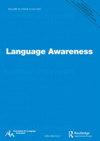现代外语学习中的互动式听力策略
IF 2.2
2区 文学
0 LANGUAGE & LINGUISTICS
引用次数: 1
摘要
摘要在双向互动听力中,听众需要使用互动技能或策略来理解含义,识别对话者的意图,做出回应,并建立共同点。然而,策略的使用可能受到学习者差异和情感因素的影响。本研究调查了五门现代外语专业学生的群体差异和一种情感因素(自我感知沟通信心)对中国母语人士互动听力策略的影响。采用问卷调查的方法,对445名大学生的听力策略进行了调查,并对20名学生进行了半结构化访谈,以揭示他们在语言专业中的听力困难。双向组间MANOVA测试显示,语言专业和沟通信心对整体和某些类型的互动听力策略的主要影响具有统计学意义。研究发现,西班牙语专业的学生比英语、法语、德语或日语专业的学生更频繁地使用策略。在所有五个语言专业中,自我感知沟通信心较高的学生比信心较低的学生更频繁地使用推理、语音和非语言策略。某些听力困难被发现是特定于语言的。一般来说,词汇大小和词汇分割是听力的主要困难,其次是形态和句法变化,以及语速快。本文章由计算机程序翻译,如有差异,请以英文原文为准。
Strategies for interactive listening in modern foreign language learning
Abstract In two-way interactive listening, listeners are expected to use interactional skills or strategies to understand meaning, recognize interlocutors’ intentions, make responses, and establish common ground. However, strategy use can be affected by learner differences and affective factors. The present study investigated the effects of group difference (students majoring in five modern foreign languages) and an affective factor (self-perceived communication confidence) on Chinese native speakers’ strategies for interactive listening. A questionnaire survey was conducted to explore the listening strategies used by 445 college students, and semi-structured interviews were conducted with 20 students to uncover listening difficulties in their language majors. A two-way between-groups MANOVA test revealed statistically significant main effects for language majors and communication confidence on overall and on certain types of strategy for interactive listening. Spanish language majors were found to use strategies more frequently than English, French, German, or Japanese major students. Students in all five language majors with higher self-perceived communication confidence used inference-making, phonological and nonverbal strategies more frequently than low-confidence students. Certain listening difficulties were found to be language specific. In general, vocabulary size as well as lexical segmentation were reported as main listening difficulties, followed by morphological and syntactic variation, and fast speech rate.
求助全文
通过发布文献求助,成功后即可免费获取论文全文。
去求助
来源期刊

Language Awareness
Multiple-
CiteScore
3.70
自引率
10.00%
发文量
18
期刊介绍:
Language Awareness encourages and disseminates work which explores the following: the role of explicit knowledge about language in the process of language learning; the role that such explicit knowledge about language plays in language teaching and how such knowledge can best be mediated by teachers; the role of explicit knowledge about language in language use: e.g. sensitivity to bias in language, manipulative aspects of language, literary use of language. It is also a goal of Language Awareness to encourage the establishment of bridges between the language sciences and other disciplines within or outside educational contexts.
 求助内容:
求助内容: 应助结果提醒方式:
应助结果提醒方式:


